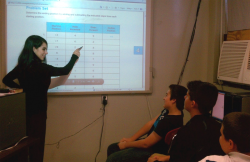Applied Learning in Teaching Program Prepares Teacher Education Candidates
By the time they begin student teaching in their senior year, pre-service teacher education majors at Eastern Kentucky University are already veterans of the classroom.
As part of EKU’s Applied Learning in Teaching Program, teacher candidates accumulate 240 hours of P-12 school-based field experiences prior to student teaching. That’s 40 hours more than the Kentucky Education Professional Standards Board now requires.
“It’s not enough for us to merely do the minimum,” explained Dr. Dorie Combs, chair of EKU’s Department of Curriculum and Instruction. “We want to do more.”
The program consists of a series of five Applied Learning courses that are completed as co-requisites to designated teacher education courses. Beginning typically with the second semester of their freshman year or first semester of their sophomore year, students apply what they are learning in their EKU classes by working a minimum of 40 hours each semester in an area school. As they proceed through a degree program, their in-school responsibilities continue to grow.
For example, during their first semester in the program, the student might tutor individual students or work with small groups under the direction of the teacher-supervisor, observe and perform other teacher tasks, help at school events, assist clubs and organizations, look for and reflect on activities that promote creativity and collaboration among the students, observe a school site-based council and much more.
Immediately before they serve as student teachers, they co-teach, collaborate and assess student learning, plan and teach at least one complete lesson, participate in a school-based learning community, and complete at least eight hours of professional development experiences. The final semester of the program requires 80 field hours.
In between, participants tutor students, participate in service learning projects and activities involving parents and families, assist with assessments and use of evaluation results, observe professional learning communities, develop a classroom management plan, and much more.
“By the time they are out on the job, our students are going to be very seasoned and much better prepared,” Combs said. “They will have had more varied experiences in different schools with diverse populations and will be much more confident.”
Conversely, a small number of students learn through the field experiences that teaching isn’t for them.
“We don’t want students to spend three years only to find out that they made the wrong choice,” Combs said. “We are helping students confirm their choice a lot sooner.”
This fall, 400 EKU students at various stages in the program were placed in schools in Madison County, as well as schools in the Corbin, London, Manchester, Danville and Somerset areas, in their hometowns whenever possible. In Spring 2013 the program, which also includes special education majors, will expand to Fayette, Clark and Estill counties and to the Middle College at EKU and draw perhaps 500-600 students.
“Over time,” Combs predicted, “we’ll see an even greater partnership with schools as they see how they can best utilize our students.”
The immediate benefits to the students are obvious. But it’s also a boon to the partnering school districts, which gain an infusion of eager-to-learn helpers at no cost (the students do earn academic credit).
“Madison County Schools works very hard, at all levels, to provide intentional and individualized instruction to our students based on formative assessment data,” said Gina Lakes, director of professional development with the district. “This allows teachers, and other staff members in the classrooms, to work closely with students to improve learning, and in turn, student achievement.
“The EKU Applied Learning students, as well as the methods students and student teachers from EKU, increase the ratio of adult-to-student contact for instruction in our classrooms. Madison County Schools is thrilled with the opportunity to have the additional instructional hands we are gaining through the new Applied Learning courses. Additionally, the flexibility of the Applied Learning students’ schedules allows for these EKU students to provide assistance in our after-school tutoring programs as well. After nearly one semester of having the Applied Learning students in our buildings, our teachers and principals are asking how they can get more assigned to their buildings.”
At Clark-Moores Middle School, teacher-supervisor Kristy Little marveled about the professionalism of teacher candidate M. Taylor Hill, as well as his willingness to take on teacher tasks. Also at Clark-Moores, teacher-supervisor Diana Flener was pleased to discover Jordan Newman’s ability to help students think through problems and creatively bridge the instruction to real-world applications.
EKU’s Department of Curriculum and Instruction has partnered with the University’s Cooperative Education program to better track the Applied Learning in Teaching students’ progress.
For more information about the program, visit tes.eku.edu/applied-learning.
Contact Information
Dr. Dorie Combs
dorie.combs@eku.edu
859-622-2154
Published on November 27, 2012
